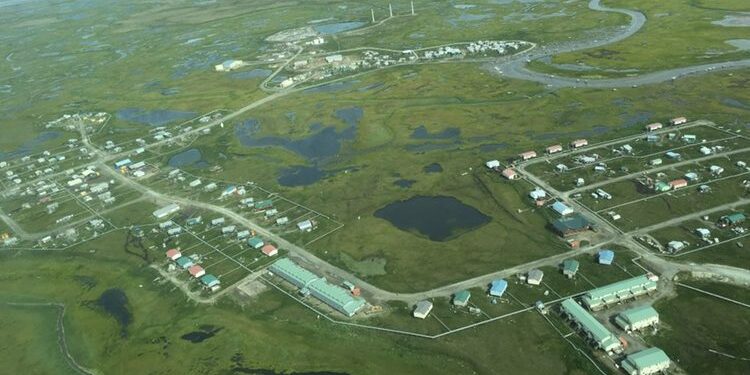The community of Hooper Bay has never had a domestic violence shelter before but that is expected to change in January, 2020. At that time, shelter staff say they hope to be operating a 24/7 shelter to serve women and their children.
Emma Smith, the Victims’ Services Coordinator for the Hooper Bay Victims Services Project grew up in Hooper Bay and exclaimed her excitement for the shelter, saying “we’re so happy!” Smith says the shelter will also serve the surrounding sub-region: including Chevak and Scammon Bay.
The project is a partnership between the Rural Alaska Community Action Program (RurAL CAP) and the Native Village of Hooper Bay. That partnership between a non-profit and tribe allows them to utilize nearly half a million dollars of funds, set aside for tribal entities from the Office for Victims of Crimes. This is a small portion of the $42 million in federal grant funding for rural Alaska public safety, which was announced by U.S. Attorney General William Barr last month.

RurAL CAP C.E.O. Patrick Anderson says plans for the shelter have been in the works for about a year, after Hooper Bay listed a domestic violence shelter as their biggest tribal justice need. He expects the comprehensive shelter to house twelve women and their children.
“The children suffer substantially when they witness domestic violence in the home and usually there are other adverse experiences that they’ve had already so our goal is to figure out how we can provide full wrap-around services and bring the family back to a non-violent state.”
– Patrick Anderson
Some of those “wrap-around” services include hiring individuals skilled in trauma-informed care and victim advocates. Ideally, the shelter would be able to give financial advice too, as Anderson acknowledges that separation from an abuser can also result in a loss of income. While exact job descriptions are still being drafted, Anderson says RurAL CAP is looking to hire up to ten people to work at the shelter.
“We expect some to have experience or be trained in how a shelter operates and make sure that only the appropriate people are there and that the safety and security of the residents are assured.”
– Patrick Anderson
Construction began in September, renovating a three-bedroom apartment donated by the Sea Lion Corporation. Cathie Clements with RurAL CAP says the shelter is part of the Sea Lion Corporation building and will have two four-person bedrooms, one three person room, and a common area.

Photo Credit: Emma Smith, used with permission
In Hooper Bay, Victims Services Coordinator Emma Smith is planning out culturally relevant programming to help future shelter residents heal.
For example, she’s looking for elders willing to share knowledge on grass-weaving or sewing. Smith envisions them going out on the tundra for food-gathering or just fresh-air.
“They say the tundra is healing, spiritually healing for someone that is turmoiling inside.”
– Emma Smith
Many details are still being worked out, Smith says, but hopefully the shelter will accommodate long-term and short-term guests. Specialists and advocates will work out of the shelter, transferring survivors to the Emmonak Women’s shelter or elsewhere if necessary.
For now, Smith is focused on getting the word out to Hooper Bay and surrounding communities about the new domestic violence shelter coming to the Yukon-Kuskokwim Delta.
The Hooper Bay Victims Services Project also includes partners from Sea Lion Corporation, U.S. Justice Department, the Emmonak Women’s Shelter, Tundra Women’s Coalition, the Alaska Native Women’s Resource Center, and the Alaska Network on Domestic Violence and Sexual Assault.
Other regional communities granted tribal-set aside funds for victims’ services include the Native Village of Kotlik, the Asa’carsarmiut Tribe (also known as Mountain Village), Holy Cross, Kawerak, Unalakleet, and the Emmonak Women’s Shelter.
If you are experiencing domestic violence, or the threat of domestic violence, you can reach out to the National Domestic Violence Hotline at 1-800-799-7233 or the Emmonak Women’s Shelter at 907-949-1443.
Image at top: Aerial view of Hooper Bay. Photo provided by Emma Smith, used with permission (2019).




